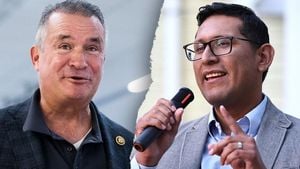Offshore wind energy has emerged as one of the focal points of the United States' clean energy future, particularly along the East Coast, where various projects are currently underway. The Biden administration’s commitment to clean energy contrasts sharply with the skepticism expressed by former President Donald Trump, who has criticized wind energy and made several claims about its inefficacy. This tension raises questions about the future viability of the offshore wind industry under varying political leadership.
The Biden administration is firmly behind offshore wind initiatives, which are aimed at reducing carbon emissions and fostering economic growth. Despite this, the road has not been smooth. High costs, legal battles, and some projects failing to secure permits have put many offshore wind developments on hold. For advocates of this clean energy source, the stakes are high. The impact of Trump's potential re-election on offshore wind projects is particularly concerning.
Recently, Trump nominated Chris Wright, CEO of Liberty Energy, known for his strong anti-renewable energy stance, to lead the Department of Energy. Wright has previously described clean energy companies as part of a "cartel" and dismisses climate change as overblown, which has left many environmental advocates apprehensive about the direction of energy policy under another Trump presidency.
During Trump’s first term, he was vocal about his aversion to offshore wind, often making exaggerated claims about its environmental effects. His nomination of Wright has only amplified these concerns. Proponents of offshore wind fear the potential for destructive policies or regulatory rollbacks aimed at dismantling progress made under the current administration.
Still, not all voices from the Republican side are firmly against the offshore wind surge. Mark Fleming, head of the nonprofit organization Conservatives for Clean Energy, expressed optimism at recent events held by the group. “It’s going to work out about as well as folks think,” he said, reflecting the sentiment of several conservatives who embrace clean energy development.
Though Trump's 2024 campaign is seeing him reiterate skeptical views on offshore wind, attendees at these conservative gatherings are not deterred. They firmly believe there are opportunities to showcase the economic benefits of offshore wind – stressing its potential for job creation and regional economic boosts.
Virginia Governor Glenn Youngkin, another Republican advocate for offshore wind, has indicated support for the technology. This strengthens the belief among some conservatives and clean energy advocates at these forums who hope to convert Trump and his advisors on the merits of offshore wind power.
Despite Trump’s harsh rhetoric about offshore drilling and wind energy, there have been instances where he has softened his positions to align with local Republican interests, particularly influencing his decisions on offshore drilling bans. Therefore, as Trump continues to campaign, his approach may evolve, depending on advancing clean energy economics.
Among the recent legislative discussions is the Inflation Reduction Act, which has spurred significant clean energy investments. Estimates suggest North Carolina could add tens of thousands of jobs and billions to its economy derived from projects spurred by the act.
For Republicans like Fleming, the key takeaway is about pragmatism. They view governing as distinct from campaigning. “Good science and good facts will rule the day,” he emphasized, underscoring their belief the economic case for offshore wind projects can sway even critics of clean energy.
Despite worries about Trump’s impact, some clean energy supporters believe bipartisan legislative actions have the potential to mitigate any drastic policy shifts. They hope for reforms to the permitting process for both fossil fuel and renewable projects, allowing for more streamlined approvals for clean energy initiatives.
Indeed, even as Trump threatens to curtail the Inflation Reduction Act, many believe core components benefiting rural regions will balance the act’s survival. This sentiment mirrored discussions from recent luncheons bringing together conservative clean energy supporters who noted the persistence of clean energy’s appeal.
Divided Congress presents both obstacles and opportunities. Some Republican leaders admit there is still ground to cover with Trump and his administration, especially when it involves promoting the economic benefits of clean energy. They expect efforts to create dialogue around clean energy advantages will be instrumental, especially at the local and state level.
Trump’s re-election may shift some dynamics, but the economic potential of offshore wind projects remains vast. Much hinges on the education efforts from within the industry to convince existing leaders of its economic viability.
Looking beyond partisan disagreements, those invested in the offshore wind industry are coalescing around data and economic projections to make their case. Organizations like E2, which evaluated potential job growth and economic contributions from clean energy projects, are equipping proponents with concrete evidence to support their claims.
At the same time, attitudes among local conservatives appear to shift slowly but surely. Much of this is framed by the local impact clean energy can create—especially as rural communities begin experiencing the benefits of new energy jobs and infrastructure.
The consensus among some circles suggests incremental reforms may shape the conversation around offshore wind energy as Trump’s policies emerge. Advocates argue for the importance of collaboration to achieve common goals, stating, “We won’t agree on everything, but opportunities to work together to move the clean energy cause forward exist.”
This balancing act—between political rhetoric and pragmatic policy—is expected to be one of the defining features of the upcoming political and economic climate around clean energy. The ultimate success of offshore wind projects under Trump's administration remains to be seen, but for now, advocates remain hopeful, focusing on what can potentially be achieved together.
While many may remain wary of Trump's past comments on clean energy, the involvement of Republican supporters who recognize the benefits of the offshore wind sector is encouraging. The future of offshore wind energy may very well depend on how effectively its advocates engage with policymakers across the aisle.



